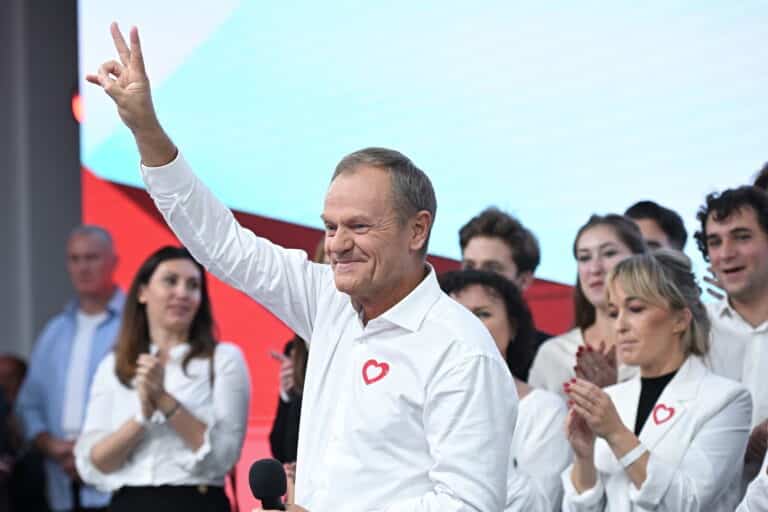Economy eyes growth after pause for breath
Economists believe that 2024 will see a recovery of the Polish economy, while 70% of Poles say that this year will be better for them financially than the previous one, an increase of 11 percentage points compared to a previous Ipsos study. But two out of three Polish respondents claim that prices will grow faster than salaries.
CPI inflation in December was 6.2%. – according to the final data from the Central Statistical Office (GUS). This is an increase compared to the preliminary reading, which indicated 6.1%. The annual average inflation in 2023 was 11.4%. compared to 14.4% a year before.
“Faith in the improvement of the economic situation is the most important reason for optimistic moods for 2024. At the same time, respondents do not ignore threats such as the demographic crisis, climate catastrophe or lack of prospects for ending the war in Ukraine,” says Joanna Skrzyńska from the Public Affairs team of Ipsos Polska.
Manufacturing sees green shoots
For many manufacturing companies, 2023 meant having to come to terms with worse-than-expected results. But the industry is turning a corner.
For example, the household appliances industry is counting on a rebound this year. BSH, which has six factories in Poland, plans to invest half a billion zlotys in Poland this year, while the clothing giant LPP has just completed a large project in Romania and will increase investments from last year’s PLN 800 million to PLN 1.2 billion
Polish pharmaceutical giants – Polpharma and Adamed – also have big ambitions. “The cash injection from the KPO will certainly stimulate the industry to act and allow it to recover after the turmoil related to the pandemic and the ongoing war in Ukraine,” says Maciej Zieliński, president of Siemens Polska.
“Last year, we observed a decline in demand for durable goods throughout Europe. However, we are convinced that in the long run the home appliances market will continue to grow steadily,” says Daniel Goszczynski, PR Manager at BSH, a company with six factories producing home appliances.
“BSH is investing approximately PLN 500 million in Poland annually. Also this year, the value of all our investments will reach a similar level. They will mainly concern the development of six factories where we produce large and small household appliances,” he adds.
The steel industry is also counting on a rebound. “Recent years have shown that completely unpredictable phenomena, such as a pandemic or geopolitical events, can rapidly disrupt the market situation,” says Sanjay Samaddar, president of ArcelorMittal Poland.
“This is a year of difficult business decisions. The shutdown of the Krakow coking plant, caused primarily by low demand, but also by the unprecedented ratio of the price of coking coal to the price of coke, was one of the most difficult decisions we have had to make in the last 12 months,” he adds.
This year, the Cognor Group, which produces semi-finished metallurgical products, aims to complete the construction of a rolling mill in Siemianowice Śląskie worth PLN 800 million. It is also modernizing the rolling mill in Kraków – the scale of the investment is PLN 200 million.
Lafarge, one of the largest cement producers in Poland, which is making an investment worth PLN 1 billion this year in the Małogoszcz Cement Plant. In addition, the company wants to enter electromobility.
Polish pharmaceutical giants also plan to spend this year. Polpharma invested approximately PLN 250 million in CAPEX and approximately PLN 200 million in research and development work. In 2024, with similar amounts allocated to R&D, the CAPEX budget will increase to PLN 350 million.
Adamed will spend approximately PLN 1 billion on investments in Poland by 2025. „We are continuing to expand the Production and Logistics Center in Pabianice and the laboratory and research facilities in Kajetany,” says Katarzyna Dubno, Director of External Relations, ESG and Health Economics, Adamed Pharma.
“The industry is facing a period of favorable conditions in terms of the possibility of increasing sales, resulting from demand factors – including: due to the aging of the population, as well as the development of the product portfolio, especially as a result of the expiration of the monopoly of many biological drugs,” says Krzysztof Kopeć, president of the Polish Association of Employers of the Pharmaceutical Industry.
Budget issues
In its latest opinion on the budget prepared by the National Bank of Poland, it was reported that Donald Tusk’s new government cannot count on the payment of PLN 6 billion from the bank’s profit to the state treasury, which was assumed in the previous version of the budget prepared during the PiS government.
“The money will not flow into the budget because there is no money,” says Edyta Wojtyla from WSB Merito University in Poznań. Speaking to the WP Newsroom program, she said: “It was planned when the year had not yet ended, so this situation does not surprise me. When there is no money, one looks for it everywhere and enters various things, as long as they are only on paper. I think that even if PiS had won the elections, this money would not be available. It’s time to stop spending money we don’t have. Budget expenditures have increased significantly and revenues have decreased. Today we have a situation where such a large amount, important for the budget, was taken from outer space.”
The net borrowing needs of the state budget in 2024 are estimated at PLN 252 billion (taking into account the rollover of existing debt) and gross at PLN 449 billion (if the debt is not rolled over).
However, 2024 should also see the release of funds from EU Cohesion Funds and the National Recovery Fund (KPO), which is something many companies are waiting for. Insufficient budgets are reportedly the main reason for the lack of investments, especially in R&D and innovation.
Growth ahead
Although inflation will soon fall to around the NBP target, it will later rebound and stabilize at an increased level, so no further rate cuts can be expected in 2024 and 2025, according to forecasts by Bank Pekao economists.
GDP growth will initially be subdued, in 2024 at 3%, but it will accelerate to 4.3% in 2025, when KPO investments will accelerate, the bank said.
“After three years of storms in the global economy, we are entering a period of calmer weather. We believe that 2024 will be a good year for the Polish economy, and 2025 will even be a very good year,” Bank Pekao economists wrote.







